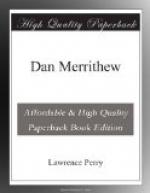CHAPTER I
The girl on the “Veiled Ladye”
The big coastwise tug Hydrographer slid stern-ward into a slip cluttered with driftwood and bituminous dust, stopping within heaving distance of three coal-laden barges which in their day had reared “royal s’ls” to the wayward winds of the seven seas.
Near-by lay Horace Howland’s ocean-going steam yacht, Veiled Ladye, which had put into Norfolk from Caribbean ports, to replenish her bunkers. There were a number of guests aboard, and most of them arose from their wicker chairs on the after-deck and went to the rail, as the great tug pounded alongside.
Grateful for any kind of a break in the monotony of the long morning, they observed with interest the movements of a tall young man, in a blue shirt open at the throat and green corduroy trousers, who caught the heaving line hurtling from the bow of the nearest barge, and hauled the attached towing-cable dripping and wriggling from the heavy waters.
He did it gracefully. There was a fine play of broad shoulders, a resilient disposition of the long, straight limbs, an impression of tiger-like strength and suppleness, not lost upon his observers, upon Virginia Howland least of all. She was not a girl to suppress a thought or emotion uppermost in her mind; and now she turned to her father with an exclamation of pleasure.
“Father,” she cried, “look! Isn’t he simply stunning! The Greek ideal—and on a tugboat!” Her dark eyes lightened with mischief. “Do you suppose he’d mind if I spoke to him?”
“He’d probably swear at you,” said young Ralph Oddington, with a grin. Then, seized by a sudden impulse for which he afterwards kicked himself, being a decent sort of chap, he drew his cigarette case from his pocket and, as the tug came to a standstill, tossed a cigarette across the intervening space. It struck the man in the back, and as he turned, Oddington called,
“Have a cigarette, Bill?”
The tugman’s lips parted, giving a flashing glimpse of big, straight, white teeth. Then they closed, and for an instant he regarded the speaker with a hard, curious expression in his quiet gray eyes, and the proffered cigarette, as though by accident, was shapeless under his heel.
It was distinctly embarrassing for the yachting party; and partly to relieve Oddington, partly out of curiosity, Virginia Howland leaned over the rail with a smile. “Please pardon us, Mr. Tugboatman. We didn’t mean to offend you; we—”
The young man again swept the party with his eyes, and then meeting the girl’s gaze full, he waited for her to complete the sentence.
“We,” she continued, “of course meant no harm.”
He did not reply for a moment, did not reply till her eyes fell.
“All right—thanks,” he said simply and then hurried forward.




